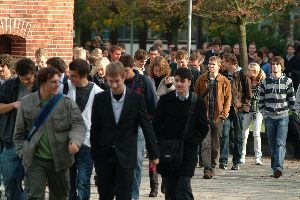In the current winter semester, the total number of students at Karlsruhe Institute of Technology has increased to 20,773. 4907 new students started their studies at KIT. With about 60 study courses offered, it considers teaching one of its three pillars of competences and represents one of the leading engineering research establishments worldwide. Demand is highest for places in the bachelor programs of industrial engineering and mechanical engineering.
After having completed the enrolment procedure for the winter semester, the number of students now exceeds 20,700 for the first time in the new millennium. Compared to the 2009/10 winter semester, the numbers of students and freshmen have increased by more than 1050 and 500, respectively. Such high numbers of students were last recorded by Universität Karlsruhe (TH) in the early 1990s.
“About 16% of the KIT students come from abroad, from more than 100 nations! This clearly shows that KIT continues to be attractive for students from all over the world in spite of our tuition fees,” underlines KIT President Professor Horst Hippler. Foreign students mainly come from the People’s Republic of China and in Europe from Turkey.
“KIT offers attractive studies with new study courses like “Materials Science and Technology”. High-quality teaching is combined with top-class research at internationally competitive laboratories. This makes us unique,” says KIT President Professor Eberhard Umbach.
In great demand were university places in the bachelor program of industrial engineering with 2796 applicants for 505 places and in mechanical engineering with 1773 applicants for 560 places. Other study courses in great demand were informatics and civil engineering. The proportion of female students is constantly higher than 27%.
“We expect to reach a total of 23,000 students in two years’ time,” says KIT President Professor Horst Hippler. “But this growth will obviously require additional infrastructure, including areas, buildings, and funds to cover staff, energy, and operation costs.”
To guarantee that eligible candidates and in particular eligible pupils leaving the secondary schools in 2012 will have the same chances to start studies as pupils in the past years, KIT, together with the Ministry of Science, Research, and Arts of Baden-Württemberg (MWK), faces major organizational and infrastructural challenges. “Together with the MWK, KIT is already working on increasing university places in highly demanded subjects and above all in mathematics, informatics, natural sciences, and engineering in order to be able to accept eligible pupils, the number of whom will double in 2012 due to the reduction of school time by one year,” outlines Professor Jürgen Becker, the KIT Chief Higher Education Officer (CHEO), who is responsible for studies and teaching. “Among others, we want to offer possibilities to start studies in the summer semester and the winter semester. To solve our room problem and to find seminar rooms for the tutorials of the basic study courses, KIT is cooperating closely with the federal state,” says Professor Becker.
In close partnership with society, KIT develops solutions for urgent challenges – from climate change, energy transition and sustainable use of natural resources to artificial intelligence, sovereignty and an aging population. As The University in the Helmholtz Association, KIT unites scientific excellence from insight to application-driven research under one roof – and is thus in a unique position to drive this transformation. As a University of Excellence, KIT offers its more than 10,000 employees and 22,800 students outstanding opportunities to shape a sustainable and resilient future. KIT – Science for Impact.

